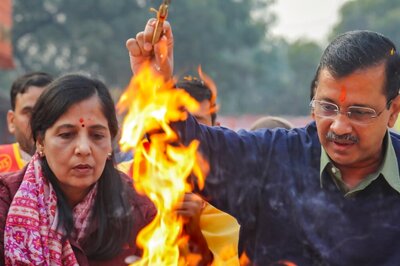
views
As Pakistan is gearing up for its 12th general elections on February 8, its deep state is leaving no stone unturned to ensure its own ‘victory’, turning the whole electoral process into a farce. A former prime minister (apparently the popular one) is in jail under various charges. And another ex-PM (the favoured one), who was previously imprisoned and then in exile, has now returned. The criminal cases against the latter are being conveniently dropped. While Pakistan’s deep state’s meddling with elections is nothing new, the crackdown by state authorities against Imran Khan and his party Tehreek-e-Insaf (PTI) have left even seasoned Pakistan analysts and political class baffled. With less than a month to go for the polling, it is clear that Pakistan is heading towards its most manipulated general elections ever.
There are ample instances of PTI being subjected to ‘systematic dismemberment’ and ‘pre-poll rigging’. Its top leader Imran Khan has been in jail since August 2023, facing multiple charges of corruption, compromising state secrets and vandalising military facilities. Many of his party’s leaders have abruptly left it, allegedly under duress, with some of them even floating their PTI’s rival factions. Imran Khan was forced out of the chairmanship of his own party because of his imprisonment. The nomination papers of multiple electoral nominees from the PTI including that of Imran Khan have been rejected by the Election Commission of Pakistan (ECP), the so-called autonomous body which is responsible for conducting the elections.
And most recently, the Supreme Court of Pakistan upheld the decision of ECP to deny the PTI its election symbol — a ‘cricket bat’. These brazen collusive attempts of Pakistan state authorities, the election body and the judiciary have raised serious doubts over the fairness of upcoming polls.
The Pakistani awaam (predominantly its youth population) believes that the Pakistan Army is behind Khan’s disqualification and the numerous cases being slapped against him. Pakistan’s history is riddled with many such instances of the Army establishing its dominance over the civilian government. In the past, even when the Army generals were not officially in power, they continued to influence the country’s decision-making and its political leadership. It is the persistent military’s meddling with politics over the decades that has sustained a perpetual political crisis in Pakistan, leading to the establishment of a deep state.
Today, Pakistan’s deep state need not maintain direct or overt political control, as it has a de-facto control over every strategic decision made in the country.
In fact, the present political engineering by Pakistan’s deep state is nothing new but a repeat of the 2018 election scenario. Just prior to the 2018 elections, Nawaz Sharif’s Pakistan Muslim League-N, or PML(N), was similarly at the receiving end of the establishment’s wrath and subsequently, with the establishment’s blessings, the PTI had come to power. Imran Khan thereafter quickly built up a close relationship with the Pakistan Army. During his prime ministerial tenure, he pretty much toed the military’s agenda in terms of his stand on the Kashmir issue (Abrogation of Article 370), improving relations with the US and somewhat managing to pull in funds to sustain the bloated military expenditure, eventually leading to a major economic crisis. However, Imran Khan’s power consolidation under military backing remained short-lived.
The fallout with the establishment first came out in the open in 2021 when former Army Chief Qamar Javed Bajwa appointed Lieutenant General Nadeem Anjum as the Director General of the Inter-Services Intelligence (ISI). Khan opposed it in favour of his own choice of General Faiz Hameed. However, he subsequently failed to make any difference. Later, both Khan and Bajwa began to have disagreements on the issues of foreign policy. Moreover, Khan started openly speaking of his private discussion with the Army on various political forums, which probably was not received well by the establishment, thereby leading to the incarceration of Imran Khan. In the present scenario, it seems the establishment has come full circle.
Like the 2018 election, the upcoming February election too, seems to be facing a similar fate. Only this time, the tides have changed whereby the PML(N) is seen to be gaining prominence at the cost of the PTI. Pakistan’s Punjab province which holds the largest seats is going to determine the fate of the winning party in the upcoming election. The deep state, under the direction of the Pakistan Army, is making every possible effort to get the majority of the votes polled in favour of PML(N) by hook or crook. The disqualification of PTI members’ candidatures along with Imran Khan’s own nomination, is undoubtedly a political manifestation of the power wielded by the country’s deep state.
As it seems, the Army is yet again engineering an invisible coup. This is aggravating the political crisis (along with the economic crisis) for Pakistan as a nation. Voters in Pakistan are aware of this, as evident from the anti-Army criticism and protests being held all across the nation. It is clear that the deep state is going to ensure a ‘suitable’ outcome of these polls and that would mark the beginning of another crisis for Pakistan.
The writer is an author and columnist and has written several books. His X handle is @ArunAnandLive. Views expressed in the above piece are personal and solely that of the author. They do not necessarily reflect News18’s views.



















Comments
0 comment